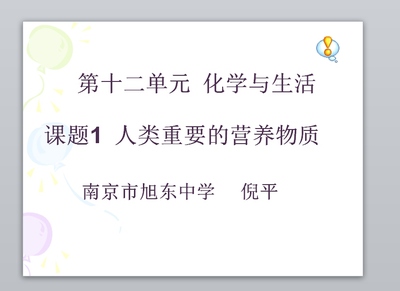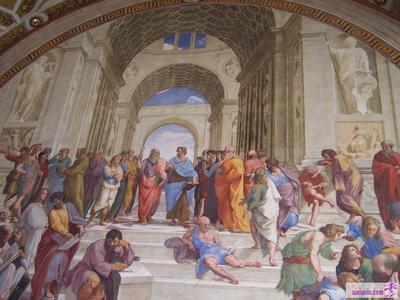卷一:古代哲学 AncientPhilosophy
第三篇亚里士多德以后的古代哲学
AncientPhilosophy afterAristotle
第26章犬儒学派与怀疑派Cynics andSceptics
知识优异的(intellectually eminent)人们与他们当时社会(contemporarysociety)的关系,在不同的时代里是非常之不同的。在某些幸运的时代里,他们大体上能与他们的环境调和,——毫无疑问他们要提出他们自己认为是必要的那些改革来,但是他们深信他们的提议是会被人欢迎的;而且即使是世界始终不曾改革的话,他们也不会因此就不喜欢他们自己所处的世界。在另一些时代里,他们是革命的,认为需要号召激烈的变革(radicalalteration),但希望这些变革(部分地是由于他们忠告的结果)在不久的将来就可以实现。又在另一些时代里,则他们对世界是绝望的,他们觉得尽管他们自己知道什么是必需的,但却绝没有可以实现的希望。这种心情很容易陷于一种更深沉的绝望,把地上的生活认为本质上都是坏的,而对好的事物则只能寄希望于来生或者是某种神秘的转变(transfiguration)上。
The relation of intellectually eminent men to contemporarysociety has been very different in
different ages. In some fortunate epochs they have been on thewhole in harmony with their
surroundings--suggesting, no doubt, such reforms as seemed to themnecessary, but fairly
confident that their suggestions would be welcomed, and notdisliking the world in which they found themselves even if itremained unreformed. At other times they have been revolutionary,considering that radical alterations were called for, but expectingthat, partly as a result of their advocacy, these alterations wouldbe brought about in the near future. At yet other times they havedespaired of the world, and felt that, though they themselves knewwhat was needed, there was no hope of its being brought about. Thismood sinks easily into the deeper despair which regards life onearth as essentially bad, and hopes for good only in a future lifeor in some mystical transfiguration.
在某些时代,所有这几种态度可以在同时为不同的人所采取。例如,让我们看一下早期的十九世纪。歌德(Goethe)是快活的,边沁(Bentham)是个改革者,雪莱(Shelley)是个革命者,而李奥巴第(Leopardi)则是个悲观主义者(pessimist)。但在大多数的时期里,伟大的作家们中间却有着一种流行的格调。在英国,他们在伊丽莎白时代和十八世纪是快活的;在法国,他们约当1750年左右变成了革命的;在德国,自从1813年以后他们是民族主义的(nationalistic)。
In some ages, all these attitudes have been adopted by differentmen living at the same time.
Consider, for example, the early nineteenth century. Goethe iscomfortable, Bentham is a
reformer, Shelley is a revolutionary, and Leopardi is a pessimist.But in most periods there has
been a prevailing tone among great writers. In England they werecomfortable under Elizabeth and
in the eighteenth century; in France, they became revolutionaryabout 1750; in Germany, they
have been nationalistic since 1813.
在教会统治(ecclesiasticaldomination)时期,也就是说从公元五世纪至十五世纪,人们在理论上所相信的与在实际上所感觉的之间,是有着一种冲突(conflict)的。在理论上世界是一个流泪泉(valeoftears),是在受苦受难(tribulation)之中对于来世的一种准备,但是在实际上作家们(他们几乎全都是教士)又不免对于教会的权势感到高兴;他们有机会从事于许多他们认为是有用的那种活动。因此他们具有着统治阶级的心理(mentality),而不是那种觉得自己是在逃亡到另一个世界里去的人们的心理。这就是贯穿着整个中世纪的那种奇怪的二元论的一部分,这种二元论是由于下列事实造成的,即教会虽然是基于出世的信仰(other-worldlybeliefs)但又是日常世界中最重要的一种制度。
During the period of ecclesiastical domination, from the fifthcentury to the fifteenth, there was a certain conflict between whatwas theoretically believed and what was actually felt.Theoretically, the world was a vale of tears, a preparation, amidtribulation, for the world to come. But in practice the writers ofbooks, being almost all clerics, could not help feeling exhilaratedby the power of the Church; they found opportunity for abundantactivity of a sort that they believed to be useful. They hadtherefore the mentality of a governing class, not of men who feelthemselves exiles in an alien world. This is part of the curiousdualism that runs through the Middle Ages, owing to the fact thatthe Church, though based on other-worldly beliefs, was the mostimportant institution in the every-day world.
基督教出世精神的心理准备(psychologicalpreparation)开始于希腊化的时期,并且是与城邦的衰颓相联系着的。希腊的哲学家们,下迄亚里士多德为止,尽管他们可以埋怨这埋怨那;但在大体上对于宇宙并不绝望,也不觉得他们自己在政治上是无能的。他们有时候可以是属于失败了的政党,但如果是这样,他们的失败也只是由于冲突中的机缘所致,而不是由于有智慧的人之任何不可避免的无能为力(inevitablepowerlessness)。甚至连那些象毕达哥拉斯(Pythagoras)或者在某种心情之下的柏拉图那样地鄙弃现象世界而力求逃避于神秘主义(mysticism)的人,也都有着要把统治阶级转化成为圣贤(saintsandsages)的具体计划。但当政权转到马其顿人(Macedonian)手里的时候,希腊的哲学家们就自然而然地脱离了政治,而更加专心致意于个人德行的问题或者解脱问题了(individualvirtue orsalvation)。他们不再问:人怎样才能够创造一个好国家?而是问:在一个罪恶的世界里,人怎样才能够有德;或者,在一个受苦受难的世界里,人怎样才能够幸福?当然这种变化仅仅是程度上的变化;这样的问题在以前也曾被人提出来过,并且后期的斯多葛派有一个时期也是关怀政治的,——但关怀的是罗马的政治而非希腊的政治。然而这个变化却仍然是一场真实的变化。除了罗马时期斯多葛主义(Stoicism)在一定限度上而外,凡是那些认真思想、认真感受的人们的观点都日益变得主观的和个人主义的了;直到最后,基督教(Christianity)终于带来了一套个人得救的福音,这就鼓舞了传教的热诚并创造了基督教教会。在这以前,始终没有过一种制度是可以让哲学家们全心全意地安身立命的,因而他们对权势的合法的爱好心就没有适当的出路。因为这种原因,所以希腊化时代的哲学家,作为人而论,就要比那些生活于城邦仍然能够鼓舞其忠诚的时代的人们,具有更大的局限性。他们仍然思想,因为他们不能不思想;但是他们几乎并不希望他们的思想在实际世界里会产生什么效果。
The psychological preparation for the other-worldliness ofChristianity begins in the Hellenistic
period, and is connected with the eclipse of the City State. Downto Aristotle, Greek philosophers, though they might complain ofthis or that, were, in the main, not cosmically despairing, nor didthey feel themselves politically impotent. They might, at times,belong to a beaten party, but, if so, their defeat was due to thechances of conflict, not to any inevitable powerlessness of thewise. Even those who, like Pythagoras, and Plato in certain moods,condemned the world of appearance and sought escape in mysticism,had practical plans for turning the governing classes into saintsand sages. When political power passed into the hands of theMacedonians, Greek philosophers, as was natural, turned aside frompolitics and devoted themselves more to the problem of individualvirtue or salvation. They no longer asked: how can men create agood State? They asked instead: how can men be virtuous in a wickedworld, or happy in a world of suffering? The change, it is true isonly one of degree; such questions had been asked before, and thelater Stoics, for a time, again concerned themselves with politics--the politics of Rome, not of Greece. But the change was none theless real. Except to a
limited extent during the Roman period in Stoicism, the outlook ofthose who thought and felt
seriously became increasingly subjective and individualistic,until, at last, Christianity evolved a gospel of individualsalvation which inspired missionary zeal and created the Church.Until that happened, there was no institution to which thephilosopher could give whole-hearted adherence, and therefore therewas no adequate outlet for his legitimate love of power. For thisreason, the philosophers of the Hellenistic period are more limitedas human beings than the men who lived while the City State couldstill inspire allegiance. They still think, because they cannothelp thinking; but they scarcely hope that their thought will bearfruit in the world of affairs.
有四派哲学大约都是在亚历山大的时代建立起来的。最有名的两派,即斯多葛派(Stoics)和伊壁鸠鲁派(Epicurean),是我们后两章的主题;在本章中我们将要讨论犬儒派(Cynic)和怀疑派(Sceptic)。
Four schools of philosophy were founded about the time ofAlexander. The two most famous, the
Stoics and Epicureans, will be the subjects of later chapters; inthe present chapter we shall be
concerned with the Cynics and Sceptics.
这两个学派中的前一派出自(通过它的创始人狄奥根尼Diogenes)安提斯泰尼(Antisthenes);他是苏格拉底(Socrates)的弟子,约长于柏拉图(Plato)二十岁。安提斯泰尼是一个非常引人注意的人物,在某些方面其有似于托尔斯泰(Tolstoy)。直到苏格拉底死后,他还生活在苏格拉底贵族弟子们的圈子里,并没有表现出任何非正统的(unorthodoxy)征象来。但是有某种东西——或者是雅典的失败,也许是苏格拉底之死,也许是他不喜欢哲学的诡辩——却使得他在已经不再年青的时候,鄙弃了他从前所重视的东西。除了纯朴的善良(simplegoodness)而外,他不愿意要任何东西。他结交工人并且穿得和工人一样。他进行露天讲演(openair
preaching),他所用的方式是没有受过教育的人也都能理解的。一切精致的哲学,他都认为毫无价值;凡是一个人所能知道的,普通的人也都能知道。他信仰“返于自然”(returntonature),并把这种信仰贯彻得非常彻底。他主张不要政府,不要私有财产,不要婚姻,不要确定的宗教。他的弟子们(如果他本人不曾)谴责奴隶制。他并不是一个严格的苦行主义者(ascetic),但是他鄙弃奢侈与一切人为的对感官快乐的追求。他说“我宁可疯狂也不愿意欢乐”。(Ihad rather be mad than delighted)①
The first of these schools is derived, through its founderDiogenes, from Antisthenes, a disciple of Socrates, about twentyyears older than Plato. Antisthenes was a remarkable character, insome
ways rather like Tolstoy. Until after the death of Socrates, helived in the aristocratic circle of his fellow disciples, andshowed no sign of unorthodoxy. But something--whether the defeatof
Athens, or the death of Socrates, or a distaste for philosophicquibbling-- caused him, when no
longer young, to despise the things that he had formerly valued. Hewould have nothing but
simple goodness. He associated with working men, and dressed as oneof them. He took to openair
preaching, in a style that the uneducated could understand. Allrefined philosophy he held to be worthless; what could be known,could be known by the plain man. He believed in the "return tonature," and carried this belief very far. There was to beno government, no private property, nomarriage, no established religion. His followers, if not hehimself, condemned slavery. He was not exactly ascetic, but hedespised luxury and all pursuit of artificialpleasures of the senses. "I had rather be mad thandelighted," he said.
安提西尼(Antisthenes)的名声被他的弟子戴奥真尼斯(Diogenes)盖过了,戴奥真尼斯“是欧济尼河上西诺普地方的青年,最初他[安提西尼]并不喜欢他;因为他是一个曾因涂改货币而被下过狱的不名誉的钱商的儿子。安提西尼命令这个青年回家去,但是他丝毫不动;他用杖打他,他也一动不动。他渴望'智慧',他知道安提斯泰尼可以教给他智慧。他一生的志愿也是要做他父亲所做过的事,要'涂改货币'(defacethecoinage),可是规模要大得多。他要涂改世上流行的一切货币。每种通行的印戳都是假的。人被打上了将帅与帝王的印戳,事物被打上了荣誉、智慧、幸福与财富的印戳;一切全都是破铜烂铁打上了假印戳罢了。”①
The fame of Antisthenes was surpassed by that of his discipleDiogenes, "a young man from
Sinope, on the Euxine, whom he [ Antisthenes] did not take to atfirst sight; the son of a
disreputable money-changer who had been sent to prison for defacingthe coinage. Antisthenes
ordered the lad away, but he paid no attention; he beat him withhis stick, but he never moved.
He wanted 'wisdom,' and saw that Antisthenes had it to give. Hisaim in life was to do as his
father had done, to 'deface the coinage,' but on a much largerscale. He would deface all the
coinage current in the world. Every conventional stamp was false.The men stamped as generals
and kings; the things stamped as honour and wisdom and happinessand riches; all were base
metal with lying superscription."
他决心象一条狗一样地生活下去,所以就被称为“犬儒”(cynic),这个字的意思就是“象犬一样”。他拒绝接受一切的习俗——无论是宗教的、风尚的、服装的、居室的、饮食的、或者礼貌的。据说他住在一个桶里,但是吉尔柏特·穆莱(GilbertMurray)向我们保证说这是个错误:因为那是一个大瓮(pitcher),是原始时代用以埋葬死人的那种瓮。②他象一个印度托钵僧(fakir)那样地以行乞为生。他宣扬友爱,不仅仅是全人类之间的友爱,而且还有人与动物之间的友爱。甚至当他还活着的时候,他的一身就聚集了许多的传说。尽人皆知,亚历山大怎样地拜访过他,问他想要什么恩赐;他回答说:“只要你别挡住我的太阳光”(onlyto stand out of my light)。
He decided to live like a dog, and was therefore called a"cynic," which means "canine." He
rejected all conventions--whether of religion, of manners, ofdress, of housing, of food, or of
decency. One is told that he lived in a tub, but Gilbert Murrayassures us that this is a mistake: it was a large pitcher, of thesort used in primitive times for burials. He lived, like an Indianfakir, by begging. He proclaimed his brotherhood, not only with thewhole human race, but also with animals. He was a man about whomstories gathered, even in his lifetime. Every one knows howAlexander visited him, and asked if he desired any favour; "only tostand out of my light," he replied.
戴奥真尼斯(Diogenes)的教导,一点也没有我们现在所称之为“玩世不恭”(cynical)的(“犬儒”的)东西,——而是恰好与之相反。他对“德行”(virtue)具有一种热烈的感情,他认为和德行比较起来,俗世的财富(worldlygoods)是无足计较的。他追求德行,并追求从欲望之下解放出来的道德自由:只要你对于幸运所赐的财货无动于衷,便可以从恐惧之下解放出来。我们可以看出,他的学说在这一方面是被斯多葛派(Stoics)所采用了的,但是他们并没有追随着他摒绝文明的欢乐(amenitiesofcivilization)。他认为普罗米修斯(Prometheus)由于把那些造成了近代生活的复杂与矫揉造作的技术带给了人类,所以就公正地受到了惩罚。在这一点上他有似于道家(Taoist)、卢梭(Rousseau)与托尔斯泰(Tolstoy),但是要比他们更加彻底。
The teaching of Diogenes was by no means what we now call"cynical"--quite the contrary. He
had an ardent passion for "virtue," in comparison with which heheld worldly goods of no
account. He sought virtue and moral freedomin liberation from desire: beindifferent to the
goods that fortune has to bestow, and you will be emancipated fromfear. In this respect, his
doctrine, as we shall see, was taken up by the Stoics, but they didnot follow him in rejecting the amenities of civilization. Heconsidered that Prometheus was justly punished for bringing to manthe arts that have produced the complication and artificiality ofmodern life. In this he resembled the Taoists and Rousseau andTolstoy, but was more consistent than they were.
虽然他是亚里士多德同时代的人,但是他的学说在品质上却属于希腊化的时代。亚里士多德是欢乐地正视世界的最后一个希腊哲学家;从他而后,所有的哲学家都是以这样或那样的形式而具有着一种逃避(retreat)的哲学。世界是不好的,让我们学会遗世而独立吧。身外之物(Externalgoods)是靠不住的(precarious);它们都是幸运的赐予,而不是我们自己努力的报酬。唯有主观的财富——即德行,或者是通过听天由命(resignation)而得到的满足——才是可靠的,因此,唯有这些才是有智慧的人所要重视的。戴奥真尼斯本人是一个精力旺盛的人,但他的学说却正象希腊化时代所有的学说一样,乃是一种投合于劳苦倦极的人们的学说,失望已经摧毁了这些人的天赋的热忱了。这种学说除了对于强有力的罪恶是一种抗议而外,当然绝不是一种可以指望促进艺术或科学或政治或任何有用的活动的学说。
His doctrine, though he was a contemporary of Aristotle, belongsin its temper to the Hellenistic
age. Aristotle is the last Greek philosopher who faces the worldcheerfully; after him, all have,
in one form or another, a philosophy of retreat. The world is bad;let us learn to be independent
of it. External goods are precarious; they are the gift of fortune,not the reward of our own
efforts. Only subjective goods --virtue, or contentment throughresignation--are secure, and
these alone, therefore, will be valued by the wise man. Diogenespersonally was a man full of
vigour, but his doctrine, like all those of the Hellenistic age,was one to appeal to weary men, in whom disappointment had destroyed natural zest. And itwas certainly not a doctrine calculated
to promote at or science or statesmanship, or any useful activityexcept one of protest against
powerful evil.
看一下在犬儒学派普及之后,他们的学说变成了什么样子,是饶有趣味的。公元前三世纪的早期,犬儒学派(Cynic)非常风行,尤其是在亚历山大港(Alexandria)。他们刊行了短篇的说教(sermon),指出没有物质财产(materialpossessions)是多么地轻松,饮食简朴可以是多么地幸福,怎样在冬天不必穿昂贵的衣服就可以保持温暖(这在埃及也许是真的!),对自己的家乡依依不舍或者悲悼自己的孩子或朋友的死亡又是何等之愚蠢。这些通俗化的犬儒学者之中有一个叫做德勒斯(Teles)的说:“我的儿子或妻子死了,那难道就有任何理由应该不顾仍然还在活着的我自己,并且不再照顾我的财产了么?”①在这一点上我们很难对于这种单纯生活感到任何的同情,它已经变得太单纯了。我们怀疑是谁高兴这种说教,是希望把穷人的苦难想象成仅仅是幻想的那些富人呢?还是力图鄙视获得了成功的事业家们的那些新的穷人呢?还是想使自己相信自己所接受的恩赐是无关重要的那些阿谀献媚者呢?德勒斯对一个富人说:
It is interesting to observe what the Cynic teaching became whenit was popularized. In the
early part of the third century B.C., the Cynics were the fashion,especially in Alexandria. They
published little sermons pointing out how easy it is to do withoutmaterial possessions, how
happy one can be on simple food, how warm one can keep in winterwithout expensive clothes
(which might be true in Egypt!), how silly it is to feel affectionfor one's native country, or to
mourn when one's children or friends die. "Because my son or mywife is dead," says Teles,
who was one of these popularizing Cynics, "is that any reason formy neglecting myself, who
am still alive, and ceasing to look after my property?" * At thispoint, it becomes difficult to
feel any sympathy with the simple life, which has grown altogethertoo simple. One wonders
who enjoyed these sermons. Was it the rich, who wished to think thesufferings of the poor
imaginary? Or was it the new poor, who were trying to despise thesuccessful business man? Or
was it sycophants who persuaded themselves that the charity theyaccepted was unimportant?
Teles says to a rich man:
“你慷慨大度地施舍给我,而我痛痛快快地取之于你,既不卑躬屈膝(grovel),也不唠叨不满。”②这是一种很便当的学说。通俗的犬儒主义并不教人禁绝(abstinence)世俗的好东西,而仅仅是对它们具有某种程度的漠不关心(indifference)而已。就欠债的人来说,这可以表现为一种使他减轻自己对于债主所负的义务的形式。我们可以看到“玩世不恭”(“犬儒的”)这个名词是怎样获得它的日常意义的。
"You give liberally and I takevaliantly from you, neither grovellingnor demeaning myself
basely nor grumbling." * A very convenient doctrine. PopularCynicism did not teach
abstinence from the good things of this world, but only a certainindifference to them. In the
case of a borrower, this might take the form of minimizing theobligation to the lender. One can
see how the word "cynic" acquired its every-day meaning.
犬儒派学说中最好的东西传到了斯多葛主义(Stoicis)m里面来,而斯多葛主义则是一种更为完备和更加圆通的哲学。
What was best in the Cynic doctrine passed over into Stoicism,which was an altogether more
complete and rounded philosophy.
怀疑主义(Scepticism)之成为一种学派的学说最初是由皮洛(Pyrrho)提倡的,皮洛参加过亚历山大的军队,并且随军远征过印度。看起来这使他发生了浓厚的旅行兴趣;他的余年是在他的故乡爱里斯城度过的,公元前275年他死在这里。除了对于以往的各种怀疑加以一定的系统化与形式化而外,他的学说里并没有多少新东西。对于感官的怀疑是从很早以来就一直在困恼着希腊哲学家的;唯一的例外就是那些象巴门尼德(Parmenides)和柏拉图那样否认知觉的认识价值的人们,他们还把他们的否定当做是宣扬知识上的教条主义(dogmatism)的一种好机会。智者们,特别是普罗泰戈拉(Protagoras)和高尔吉亚(Gorgias),曾经被感官知觉(sense-perception)的模糊极其显著的矛盾而引到了一种有似于休谟的主观主义(subjectivism)。皮洛似乎(因为他很聪明地没有写过任何书)在对感官的怀疑主义之外,又加上了道德的与逻辑的怀疑主义。据说他主张绝不可能有任何合理的理由,使人去选择某一种行为途径而不选择另外的一种。在实践上,这就意味着一个人无论住在哪个国家里,都是顺从着那里的风俗的。一个近代的信徒会在礼拜日到教堂去,并且奉行正确的跪拜仪式,而不必具有任何被人认为是足以激发这些行动的宗教信仰。古代的怀疑主义者奉行着全套的异教宗教仪节,有时候甚至于他们本人就是祭司;他们的怀疑主义向他们保证了这种行为不可能被证明是错误的,而他们的常识感(这种常识感比他们的哲学更经久)又向他们保证了这样做是便当的。
Scepticism, as a doctrine of the schools, was first proclaimedby Pyrrho, who was in
Alexander's army, and campaigned with it as far as India. It seemsthat this gave him a
sufficient taste of travel, and. that he spent the rest of his lifein his native city, Elis, where he died in 275 B.C. There was notmuch that was new in his doctrine, beyond a certain
systematizing and formalizing of older doubts. Scepticism withregard to the senses had
troubled Greek philosophers from a very early stage; the onlyexceptions were those who, like
Parmenides and Plato, denied the cognitive value of perception, andmade their denial into an
opportunity for an intellectual dogmatism. The Sophists, notablyProtagoras and Gorgias, had
been led by the ambiguities and apparent contradictions ofsense-perception to a subjectivism
not unlike Hume's. Pyrrho seems (for he very wisely wrote no books)to have added moral and
logical scepticism to scepticism as to the senses. He is said tohave maintained that there could
never be any rational. ground for preferring one course of actionto another. In practice, this
meant that one conformed to the customs of whatever countryoneinhabited. A modern disciple
would go to church on Sundays and. perform the correctgenuflexions, but without any of the
religious beliefs that are supposed to inspire these actions.Ancient Sceptics went through the
whole pagan ritual, and were even sometimes priests; theirScepticism assured them that this
behaviour could not be proved wrong, and their common sense (whichsurvived their
philosophy) assured them that it was convenient.
怀疑主义自然地会打动许多不很哲学的头脑。人们看到了各派之间的分歧以及他们之间的争论的尖锐,于是便断定大家全都一样地自命为具有实际上是并不可能获得的知识。怀疑主义是懒人的一种安慰,因为它证明了愚昧无知的人和有名的学者是一样的有智慧。对于那些品质上要求着一种福音的人来说,它可能似乎是不能令人满意的;但是正象希腊化时期的每一种学说一样,它本身就成为了一付解忧剂而受人欢迎。为什么要忧虑未来呢?未来完全是无从捉摸的。你不妨享受目前;“未来的一切都还无从把握”。因为这些原因,怀疑主义在一般人中就享有了相当的成功。
Scepticism naturally made an appeal to many unphilosophic minds.People observed the
diversity of schools and the acerbity of their disputes, anddecided that all alike were pretending to knowledge which was infact unattainable. Scepticism was a lazy man's consolation, sinceit showed the ignorant to be as wise as the reputed men oflearning. To men who, by temperament, required a gospel, it mightseem unsatisfying, but like every doctrine of the Hellenisticperiod it recommended itself as an antidote to worry. Why trouble about the future? It is wholly uncertain. Youmay as well enjoy the present; "What'sto come is still unsure." For these reasons, Scepticismenjoyed a considerable popular success.
应该指出,怀疑主义作为一种哲学来说,并不仅仅是怀疑而已,并且还可以称之为是武断的怀疑。科学家说:“我以为它是如此如此,但是我不能确定”。具有知识好奇心的人说:“我不知道它是怎样的,但是我希望能弄明白”。哲学的怀疑主义者则说:“没有人知道,也永远不可能有人知道”。正是这种教条主义(dogmatism)的成份,便使得怀疑主义的体系有了弱点。怀疑主义者当然否认他们武断地肯定了知识的不可能性,但是他们的否认却是不大能令人信服的。
It should be observed that Scepticism as a philosophy is notmerely doubt, but what may be
called dogmatic doubt. The man of science says "I think it is so-and-so, but I am not sure."The
man of intellectual curiosity says "I don'tknow how it is, but I hope to find out." The
philosophical Sceptic says "nobody knows, andnobody ever can know." It is this element of
dogmatism that makes the system vulnerable. Sceptics, of course,deny that they assert the
impossibility of knowledge dogmatically, but their denials are notvery convincing.
然而,皮洛的弟子蒂孟(Timon)提出了一种理智上的论证,这种论证从希腊逻辑的立场来说是很难于答覆的。希腊人所承认的唯一逻辑是演绎(deductive)的逻辑,而一切演绎都得象欧几里德(Euclid)那样,必须是从公认为自明的普遍原则出发。但蒂孟否认有任何找得出这种原则来的可能性。所以一切就都得靠着另外的某种东西来证明了;于是一切的论证要末便是循环的,要末便是系在空虚无物上面的一条无穷无尽的链锁。而这两种情形无论哪一种,都不能证明任何东西。我们可以看到,这种论证就砍中了统治着整个中世纪的亚里士多德哲学的根本。
Pyrrho's disciple Timon, however, advanced some intellectualarguments which, from the
standpoint of Greek logic, were very hard to answer. The only logicadmitted by the Greeks was
deductive, and all deduction had to start,like Euclid, from general principlesregarded as selfevident. Timon denied the possibility offinding such principles. Everything, therefore, will
have to be proved by means of something else, and all argument willbe either circular or an
endless chain hanging from nothing. In either case nothing can beproved. This argument, as we
can see, cut at the root of the Aristotelian philosophy whichdominated the Middle Ages.
在我们今天被那些并不是完全怀疑的人们所宣扬的某些形式的怀疑主义,对于古代的怀疑派并不曾出现过。他们并不怀疑现象,也不疑问那些他们认为是仅只表示我们所直接知道的有关现象的命题。蒂孟大部分的著作都已佚失了,但他现存的两句话可以说明这一点。一句是说:“现象永远是有效的”。另一句是说:“蜜是甜的,我决不肯定;蜜看来是甜的,我完全承认。”①一个近代的怀疑主义者会指出,现象仅仅是出现,它既不有效也不无效;有效或无效的必须是一个陈述;但并没有一种陈述能够和现象联系得如此之密切,以致于不可能有虚假。由于同样的理由,他也会说“蜜看来是甜的”这一陈述仅仅是高度或然的,而不是绝对确实可靠的。
Some forms of Scepticism which, in our own day, are advocated bymen who are by no means
wholly sceptical, had not occurred to the Sceptics of antiquity.They did not doubt phenomena,
or question propositions which, in their opinion, only expressedwhat we know directly
concerning phenomena. Most of Timon's work is lost, but twosurviving fragments will
illustrate this point. One says "Thephenomenon is always valid." The other says: "That honey is
sweet I refuse to assert; that it appears sweet, I fullygrant." * A modern Sceptic would point out that thephenomenon merely occurs, and is not either valid or invalid; whatis valid or invalid must be a statement, and no statement can be soclosely linked to the phenomenon as to be incapable of falsehood.For the same reason, he would say that the statement "honey appearssweet" is only highly probable, not absolutely certain.
在某些方面,蒂孟的学说非常有似于休谟(Hume)的学说。他认为某些从未被人观察到的东西——例如原子——就不能有效地被我们所推知;当两种现象屡屡被我们观察到在一片的时候,我们就可以从一个推知另一个。
In some respects, the doctrine of Timon was very similar to thatof Hume. He maintained that
something which had never been observed--atoms, for instance--couldnot be validly inferred; but
when two phenomena had been frequently observed together, one couldbe inferred from the
other.
蒂孟在他悠长的一生的晚年就住在雅典,并于公元前235年死于雅典。随着他的死,皮洛的学派作为一个学派就告结束了;但是他的学说——说来似乎很奇怪——多少经过了改造之后,却被代表柏拉图传统的学园接受过来了。
Timon lived at Athens throughout the later years of his longlife, and died there in 235 B.C. With
his death, the school of Pyrrho, as a school, came to an end, buthis doctrines, somewhat modified, were taken up, strange as it mayseem, by the Academy, which represented the Platonictradition.
造成这一惊人的哲学革命的人是与蒂孟同时代的人阿塞西劳斯(Arcesilaus),他大约老死于公元前240年。大多数人所接受于柏拉图的乃是信仰一个超感的理智的世界,信仰不朽的灵魂对可朽的肉体的优越性。但柏拉图是多方面的,在某些方面也可以把他看作是在宣扬怀疑主义。柏拉图笔下的苏格拉底是自称一无所知的;我们自然而然地总把这话认为是讽刺,但是这话也可以认真地加以接受。有许多篇对话并没有达到任何正面的结论,目的就在要使读者处于一种怀疑状态。有些篇对话——例如《巴门尼德篇》的后半部——则似乎是除了指明任何问题的正反两方都可以提出同等可信的理由而外,并没有什么别的目的。柏拉图式的辩证法(dialectic)可以认为是一种目的而不是一种手段;若是这样加以处理的话,则它本身就成为对于怀疑主义的一种最可赞美的辩护。这似乎就是阿塞西劳斯所解说柏拉图的方式,他自认为仍然是在追随着柏拉图的。他砍掉了柏拉图的头,但是保留下来的躯干却无论如何仍然是真的。
The man who effected this surprising philosophic revolution wasArcesilaus, a contemporary of T
imon, who died as an old man about 240 B.C. What most men havetaken from Plato is belief in a
supersensible intellectual world and in the superiority of theimmortal soul to the mortal body. But Plato was many-sided, and in somerespects could be regarded as teaching scepticism. The
Platonic Socrates professes to know nothing; we naturally treatthis as irony, but it could be taken seriously. Many of thedialogues reach no positive conclusion, and aim at leaving thereader in a state of doubt. Some--the latter half of theParmenides, for instance--might seem to have no purpose except toshow that either side of any question can be maintained with equalplausibility. The Platonic dialectic could be treated as an end,rather than a means, and if so treated it lent itself admirably tothe advocacy of Scepticism. This seems to have been the way inwhich Arcesilaus interpreted the man whom he still professed tofollow. He had decapitated Plato, but at any rate the torso thatremained was genuine.
阿塞西劳斯的教学方式会有许多地方是值得表扬的,假使跟他学习的青年人能够不为它所麻痹的话。他并不主张任何论点,但是他却要反驳学生所提出来的任何论点。有时候他会自己前后提出两个互相矛盾的命题,用以说明怎样就可以令人信服地论证两者之中的任何一个命题。一个有足够的叛逆勇气的学生,就可以学到机智并且避免谬误;但事实上除了机伶和对于真理漠不关心而外,似乎并没有人学到了任何的东西。阿塞西劳斯的影响是如此之大,以至于整个的学园大约有两百年之久一直都是怀疑主义的。
The manner in which Arcesilaus taught would have had much tocommend it, if the young men
who learnt from him had been able to avoid being paralysed by it.He maintained no thesis, but
would refute any thesis set up by a pupil. Sometimes hewould himself advance two contradictory
propositions on successive occasions, showing how to argueconvincingly in favour of either. A
pupil sufficiently vigourous to rebel might have learnt dexterityand the avoidance of fallacies;
in fact, none seem to have learnt anything except cleverness andindifference to truth. So great
was the influence of Arcesilaus that the Academy remained scepticalfor about two hundred years.
在这一怀疑时期的中叶,发生了一件有趣的事情。公元前156年雅典派至罗马的外交使团有三位哲学家,其中有一个就是不愧继任阿塞西劳斯作学院首领的那位卡尔内亚德(Carneades)。他看不出有什么理由他作使臣的尊严就应该妨碍他的这次大好机会,于是他就在罗马讲起学来。那时候的青年人都渴望模仿希腊的风气,学习希腊的文化,于是都蜂拥而来听他讲学。他的第一篇讲演是发挥亚里士多德和柏拉图的关于正义的观点,并且是彻底建设性的。然而他的第二篇讲演即是反驳他第一次所说过的一切,并不是为了要建立相反的结论,而仅仅是为了要证明每一种结论都是靠不住的。柏拉图笔下的苏格拉底论证说,以不公道加于人对于犯者来说要比忍受不公道是一桩更大的罪过。卡尔内亚德在他的第二篇讲演里,非常轻蔑地对待了这种说法。他指出,大国就是由于他们对软弱的邻邦进行不正义的侵略而成为大国的;这一点在罗马是不大好否认的。船破落水的时候,你可以牺牲别的弱者而拯救你自己的生命;如果你不这样做,你就是个傻瓜。他似乎认为“先救妇孺”并不是一句可以导致个人得救的格言(maxim)。如果你在得胜的敌人面前溃退的时候已经丢失了你的马,而又发现有一个受伤的同志骑着一匹马,那末你应该怎么办呢?如果你是有理智的,你就会把他拉下马,抢过他的马来,不管正义是怎么样的讲法。这一切不大有建设性的论证出于一个名义上是柏拉图的追随者之口,真是令人惊讶的,但是它似乎曾使得具有近代头脑的罗马青年们大为高兴。
In the middle of this sceptical period, an amusing incidentoccurred. Carneades, a worthy
successor of Arcesilaus as head of the Academy, was one of threephilosophers sent by Athens on
a diplomatic mission to Rome in the year 156 B.C. He saw no reasonwhy his ambassadorial
dignity should interfere with the main chance, so he announced acourse of lectures in Rome. The
young men, who, at that time, were anxious to ape Greek manners andacquire Greek culture,
flocked to hear him. His first lecture expounded the views ofAristotle and Plato on justice, and
was thoroughly edifying. His second, however, was concerned inrefuting all that he had said in
his first, not with a view to establishing opposite conclusions,but merely to show that every
conclusion is unwarranted. Plato's Socrates had argued thatto inflict injustice was a greater evil to the perpetrator than tosuffer it. Carneades, in his second lecture, treated thiscontention with scorn. Great States, hepointed out, had become great by unjust aggressions against theirweaker neighbours; in Rome, this could not well be denied. In ashipwreck, you may save your life at the expense of some oneweaker, and you are a fool if you do not. "Women andchildren first," he seems to think, is not a maxim that leads topersonal survival. What would you do if you were flying from avictorious enemy, you had lost your horse, but you found a woundedcomrade on a horse? If you were sensible, you would drag him offand seize his horse, whatever justice might ordain. All this notvery edifying argumentation is surprising in a nominal follower ofPlato, but it seems to have pleased the modern-minded Romanyouths.
但是它却使得有一个人大不高兴,那个人就是老卡图(elder Cato);老卡图代表着严峻的、僵硬的、愚蠢而又粗暴的道德规范(moralcode),正是靠了这种道德规范罗马人才打败了迦太基(Carthage)的。老卡图从年青到年老都过着简朴的生活,一早就其床,进行严格的体力劳动,只吃粗糙的食物,并且从未穿过一件价值一百辨士以上的衣服。对于国家他是忠心耿耿的,他拒绝一切贿赂(bribery)和贪污(plunder)。他严格要求别的罗马人也具有他自己所实行的一切德行,并且坚持说控诉和检举坏人乃是一个正直的人所能做的最好的事情。他竭力推行古罗马的严肃的风尚:
There was one man whom it did not please and that was the elderCato, who represented the stern,
stiff, stupid, and brutal moral code by means of which Rome haddefeated Carthage. From youth
to old age, he lived simply, rose early, practised severe manuallabour, ate only coarse food, and
never wore a gown that cost over a hundred pence. Towards the Statehe was scrupulously honest,
avoiding all bribery and plunder. He exacted of other Romans allthe virtues that he practised
himself, and asserted that to accuse and pursue the wicked was thebest thing an honest man could
do. He enforced, as far as he could, the old Roman severity ofmanners:
“卡图把一个叫做马尼里乌斯的人赶出了元老院,这个人本来是极有希望在下一年被任命为执政官的,仅仅因为这个人在白天并且当着自己女儿的面前太多情地吻了自己的妻子;并且卡图在谴责他做这件事时还告诉他说,除非在打雷的时候,他自己的妻子是从不吻他的”。①
" Cato put out of the Senate also, one Manilius, who was ingreat towardness to have been made
Consul the next year following, only because he kissed his wife toolovingly in the day time,
and before his daughter: and reproving him for it, he told him, hiswife never kissed him, but
when it thundered."
卡图当政的时候便禁止奢侈和宴会。他要他的妻子不仅哺乳她自己的孩子,还要哺乳他奴隶们的孩子,为的是用同样的奶喂养起来之后,奴隶们的孩子就可以爱他自己的孩子了。当他的奴隶年老不能工作时,他就毫不怜惜地把他们卖掉。他坚持他的奴隶们应当永远不是做工便是睡觉。他鼓励他的奴隶们互相争吵,因为“他不能容忍奴隶们居然做了好朋友”。若是有一个奴隶犯了严重的过错,他就把其余的奴隶都召来,并且诱导他们来咒骂这个犯过错的人罪该万死;然后他就当着其余奴隶们的面前亲手把他处决。
When he was in power, he put down luxury and feasting. He madehis wife suckle not only her
own children, but also those of his slaves, in order that, havingbeen nourished by the same
milk, they might love his children. When his slaves were too old towork, he sold them
remorselessly. He insisted that his slaves should always be eitherworking or sleeping. He
encouraged his slaves to quarrel with each other, for "he could notabide that they should be
friends." When a slave had committed a grave fault, he would callin his other slaves, and
induce them to condemn the delinquent to death; he would then carryout the sentence with his
own hands in the presence of the survivors.
卡图和卡尔内亚德之间的对比真是非常全面的:一个是由于道德过分严厉、过分传统以至于粗暴,另一个是由于道德过分放恣、过分沾染上了希腊化世界的社会堕落以至于下贱。
The contrast between Cato and Carneades was very complete: theone brutal through a morality
that was too strict and too traditional, the other ignoble througha morality that was too lax and
too much infected with the social dissolution of the Hellenisticworld.
“马尔库斯·卡图从一开始——从青年们开始学希腊语,从而希腊语在罗马日益为人重视的时候——就不喜欢这件事:怕的是渴望学习知识与辩论的罗马青年们,会完全忘掉荣誉与武力的光荣。……于是有一天他就在元老院里公开地攻击这几位使臣在这里呆得时间太久,而且没有赶快办事:还要考虑到这些使臣都是狡猾的人,很容易说服别人相信他们。假使没有其他方面的考虑的话,仅此一点也就足以说服元老院对使臣们做出一个决定的答复来,好把他们遣送回国去教书,去教他们自己的希腊孩子,别让他们再管罗马的孩子了;让罗马的孩子们还象从前一样地学习着服从法律和元老院吧。他向元老院说这番话,并不是出于他对卡尔内亚德有任何的私仇或恶意(象某些人所猜想的那样):而是因为他总是仇视哲学的"。①
" Marcus Cato, even from the beginning that young men began tostudy the Greek tongue, and
that it grew in estimation in Rome, did dislike of it: fearing lestthe youth of Rome that were
desirous of learning and eloquence, would utterly give over thehonour and glory of arms. . . .
So he openly found fault one day in the Senate, that theAmbassadors were long there, and had
no dispatch: considering also they were cunning men, and couldeasily persuade what they
would. And if there were no other respect, this only might persuadethem to determine some
answer for them, and to send them home again to their schools, toteach their children of
Greece, and to let alone the children of Rome, that they mightlearn to obey the laws and the
Senate, as they had done before. Now he spake thus to the Senate,not of any private ill will or
malice he bare to Carneades, as some men thought: but because hegenerally hated philosophy."
在卡图的眼里,雅典人是没有法律的低等人;所以他们若被知识分子的浅薄的诡辩术所腐蚀的话,那是没有关系的;但是罗马青年则必须是清教徒式的、帝国主义的、无情的而又愚昧的。然而他并没有成功;后来的罗马人不但保存了卡图的许多毛病,同时还接受了卡尔内亚德的许多毛病。
The Athenians, in Cato's view, were a lesser breed without thelaw; it did not matter if they
were degraded by the shallow sophistics of intellectuals, but theRoman youth must be kept
puritanical, imperialistic, ruthless, and stupid. He failed,however; later Romans, while retaining many of his vices, adoptedthose of Carneades also.
继卡尔内亚德(约当公元前180-110年)之后的下一任学园园长是一个迦太基人(Carthaginian),他的真名字是哈斯德鲁拔(Hasdrubal),但是他和希腊人打交道时喜欢自称为克来多马柯(Clitomachus)。与卡尔内亚德之把自己只限于讲学不同,克来多马柯写了四百多部书,其中有些是用腓尼基文写的。他的原则似乎和卡尔内亚德的一样。在某些方面,它们是有用的。这两位怀疑派都从事反对那些变得日益广泛流行的占卜(divination)、巫术和星相学(astrology)的信仰。他们也发展了一种建设性的有关或然性的程度的学说;尽管我们永远不可能有理由感到确实的可靠性,但是某些东西却似乎要比别的东西更近乎真实。或然性应该是我们实践的指导,因为根据各种可能的假设中之或然性最大的一种而行事,乃是合理的。这种观点也是大多数近代哲学家所同意的一种观点。不幸的是发挥这种观点的书籍已经失传了;我们很难依据现存的一些提示而重新构造出来这种学说。
The next head of the Academy, after Carneades (ca. 180 to ca.110 B.C.), was a Carthaginian
whose real name was Hasdrubal, but who, in his dealings withGreeks, preferred to call himself
Clitomachus. Unlike Carneades, who confined himself to lecturing,Clitomachus wrote over four
hundred books, some of them in the Phoenician language. Hisprinciples appear to have been the
same as those of Carneades. In some respects, they were useful.These two Sceptics set
themselves against the belief in divination, magic, and astrology,which was becoming more and
more widespread. They also developed a constructive doctrine,concerning degrees of probability;
although we can never be justified in feeling certainty, somethings are more likely to be true than others. Probability shouldbe our guide in practice, since it is reasonable to act on the mostprobable of possible hypotheses. This view is one with which mostmodern philosophers would
agree. Unfortunately, the books setting it forth are lost, and itis difficult to reconstruct the
doctrine from the hints that remain.
克来多马柯之后,学园就不再是怀疑主义的了,并且从安提阿古(Antiochus,他死于公元前69年)而后,它的学说有好几个世纪实际上已经变得和斯多葛派的怀疑主义难以区分了。
After Clitomachus, the Academy ceased to be sceptical, and fromthe time of Antiochus (who died
in 69 B.C.) its doctrines became, for centuries, practicallyindistinguishable from those of the
Stoics.
人被打上了将帅与帝王的印戳,事物被打上了荣誉、智慧、幸福与财富的印戳;,诺索斯(假如我们知道一点的话)早在两千多年以前就可能有过怀疑派,他们以怀疑动物的女神有没有神性来取悦于放荡的廷臣们。艾奈西狄姆的年代无法确定。他抛开了卡尔内亚德所宣扬的或然性学说,又回到了怀疑主义最初的形式上去。他的影响相当大;追随他的有公元二世纪时的诗人鲁西安以及稍后的古代怀疑派哲学家中唯一有著作流传下来的塞克斯托·恩皮里库斯。例如,有一片短文《反对信仰神的论证》曾被爱德文·比万在他的《晚期希腊宗教》一书第52-56页里译为英文,并且据他说这或许就是塞克斯托·恩皮里库斯根据克来多马柯的口授而采自卡尔内亚德的。
Scepticism, however, did not disappear. It was revived by theCretan Aenesidemus, who came
from Knossos, where, for aught we know, there may have beenSceptics two thousand years
earlier, entertaining dissolute courtiers with doubts as to thedivinity of the mistress of animals. The date of Aenesidemus isuncertain. He threw over the doctrines on probability advocated byCarneades, and reverted to the earliest forms of Scepticism. Hisinfluence was considerable; he was followed by the poet Lucian inthe second century A.D., and also, slightly later, by SextusEmpiricus, the only Sceptic philosopher of antiquity whose workssurvive. There is, for example, a short treatise, "ArgumentsAgainst Belief in a God," translated by Edwyn Bevan in his LaterGreek Religion, pp. 52-56, and said by him to be probably taken bySextus Empiricus from Carneades, as reported by Clitomachus.
这片文章一开始就解释说,在行为上怀疑派乃是正统的:“我们怀疑派在实践上追随着世人的做法,并且对它没有任何的意见。我们谈到神,把他们当做是存在的,我们敬神并且说他们执行天命;但是这样说的时候,我们并没有表示信仰,从而避免了教条者们的鲁莽轻率”。
This treatise begins by explaining that, in behaviour, theSceptics are orthodox: "We sceptics
follow in practice the way of the world, but without holding anyopinion about it. We speak of the
Gods as existing and offer worship to the Gods and say that theyexercise providence, but in saying this we express no belief, andavoid the rashness of the dogmatisers."
接着他就论证说,人们对于神的性质是意见分歧的,例如有人认为他是有身体的,又有人认为他是没有身体的。我们既然对他没有任何的经验,所以我们就不能知道他的属性。神的存在并不是自明的,所以才需要证明。同时他还有一个比较混乱的论证,指出这样的证明乃是不可能的。其次,他就谈到了罪恶这一问题,并结论说:
He then argues that people differ as to the nature of God; forinstance, some think Him corporeal,
some incorporeal. Since we have no experience of Him, we cannotknow His attributes. The
existence of God is not self-evident, and therefore needsproof. There is a somewhat confused
argument to show that no such proof is possible. He next takes upthe problem of evil, and
concludes with the words:
“那些积极肯定神存在的人,就不能避免陷于一种不虔敬(impiety)。因为如果他们说神统御着万物,那末他们就把他当成是罪恶事物的创作者了;另一方面,如果他们说神仅只统御着某些事物或者不统御任何事物;那末他们就不得不把神弄成是心胸狭隘的或者是软弱无能的了,而这样做便显然是一种十足的不虔敬。”
"Those who affirm positively that God exists cannot avoidfalling into an impiety. For if they say
that God controls everything, they make Him the author of evilthings; if, on the other hand, they
say that He controls some things only, or that He controls nothing,they are compelled to make
God either grudging or impotent, and to do that is quite obviouslyan impiety."
怀疑主义尽管继续打动着某些有教养的个人一直要到公元后三世纪,但是它却与日益转向教条化的宗教和得救学说的时代性格背道而驰。怀疑主义者有足够的力量能使有教育的人们对国家宗教不满,但是它却提供不出任何积极的东西(哪怕是在纯知识的领域内)来代替它。自从文艺复兴以来,神学上的怀疑主义(就它大多数的拥护者而论)已经被对于科学的热诚信仰所代替了,但是在古代却并没有这种对怀疑的代替品。古代世界没有能够回答怀疑派的论证,于是就回避了这些论证。奥林匹克的神已经不为人所相信了,东方宗教入侵的道路已经扫清了,于是东方的宗教就来争取迷信者们的拥护,直到基督教的胜利为止。
Scepticism, while it continued to appeal to some cultivatedindividuals until somewhere in the
third century A.D., was contrary to the temper of the age, whichwas turning more and more to
dogmatic religion and doctrines of salvation. Scepticism had enoughforce to make educated men
dissatisfied with the State religions, but it had nothing positive,even in the purely intellectual sphere, to offer in their place.From the Renaissance onwards, theological scepticism has beensupplemented, in most of its advocates, by an enthusiastic beliefin science, but in antiquity there was no such supplement to doubt.Without answering the arguments of the Sceptics, the ancient worldturned aside from them. The Olympians being discredited, the waywas left clear for an invasion of oriental religions, whichcompeted for the favour of the superstitious until the triumph ofChristianity.
========================================
①贝恩,卷二,第4,5页;穆莱,《五个阶段》,第113-114页。
①穆莱,《五个阶段》,第117页。
②同上,第119页。
] 12;《希腊化时代》(1923年,剑桥板),第84页以下。
②同上,第86页。
①转引自爱德文·比万:《斯多葛派与怀疑派》,第126页。
①诺尔斯译,普鲁塔克《名人传》,马尔库斯·卡图传。
①诺尔斯译,普鲁塔克《名人传》,马尔库斯·卡图传。
(待续)
 爱华网
爱华网



